Two years ago, Jenn Wieckowski and her 10-year-old daughter Lizzie were leaving their neighbor’s Forever Echo Farm in Boxford, Massachusetts, when they decided to stop and visit a newly arrived palomino gelding. Neither mother nor daughter could have imagined then that this green 5-year-old Tennessee Walking Horse would not only become Lizzie’s first official event horse, but that he would take her all the way to this year’s U.S. Eventing Association Area I Championships, held Aug. 16-17 in Geneseo, New York.
But perhaps even more shocking was what they learned in the months after they purchased “Ghost.” In his short life, the youngster had suffered severe neglect not once but twice, and if not for the quick-thinking intervention of a stranger, he might not even be alive.
When they met Ghost, the Wieckowskis were absolutely not in the market for a new horse. They already had Lizzie’s older pony, Wills, and her current mount, Max, living at their Wild Meadow Farm, also in Boxford. Jenn knew her daughter’s next mount should ideally have the training and experience to bring her up the eventing levels. But that day, something about the youngster spoke to Jenn, who admits she did not grow up with horses and has been learning alongside her daughter.
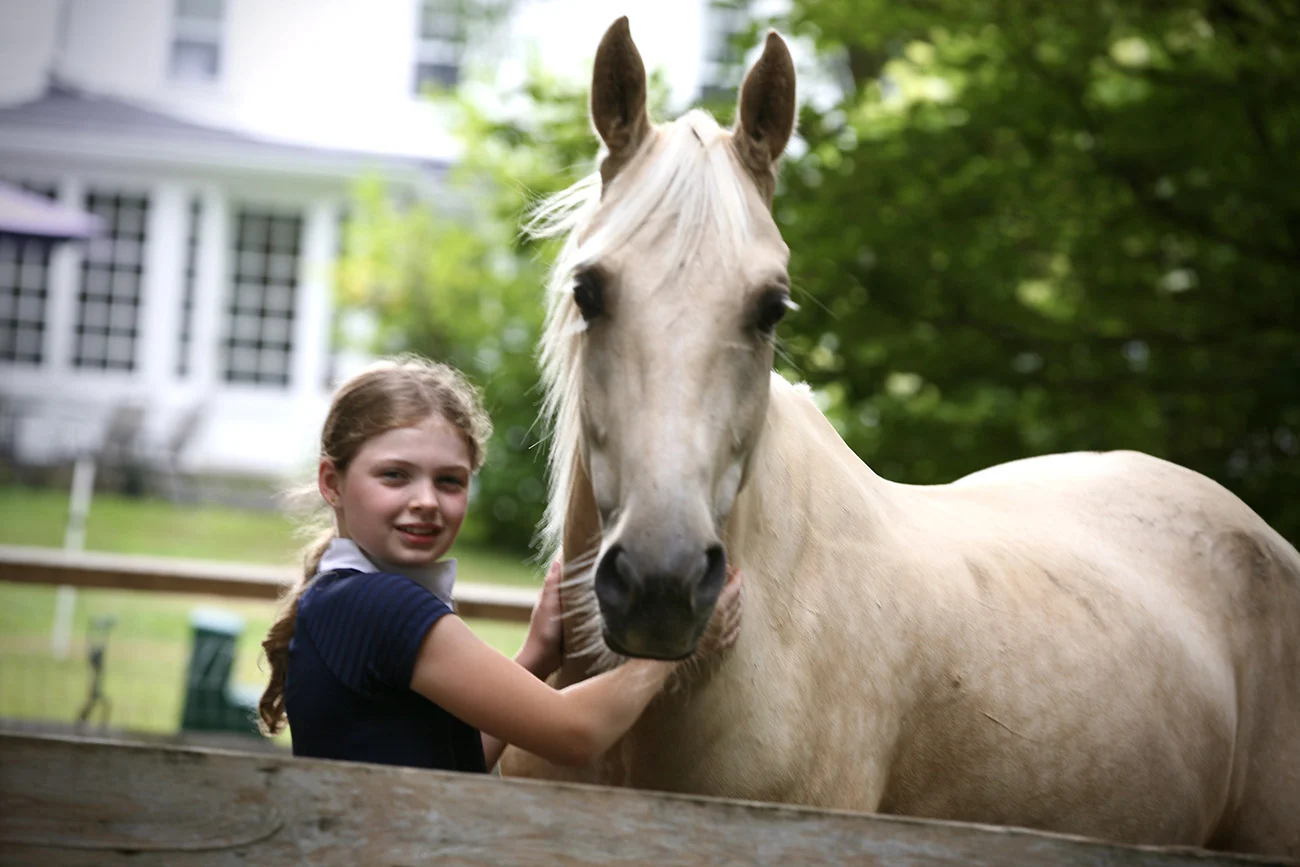
“He was the sweetest thing and so friendly, with the goofiest personality,” Jenn said. “He was like a goofy puppy dog. It was winter, and he pulled Lizzie’s hat off, played around with it, then gave it back.”
A friend of facility owner Melissa Horrigan had sent her Ghost’s sales ad; Horrigan brought him up from North Carolina, sight unseen, for a client, but so far it wasn’t proving to be a perfect match. The youngster had 60 days of basic training down south. He remained spooky and a little anxious, even jumping the 5-foot fence surrounding his paddock one day to get away from another horse. Despite those factors, Ghost pulled on Jenn’s heart.
“We just kind of connected,” Jenn said. “It was just one of those feelings, that we should have this horse. So I told Melissa if her client didn’t want him, we’d be happy to consider buying him.”
A few weeks later, Horrigan reached out and asked if Jenn was still interested.
“We probably shouldn’t have done this, but we threw Lizzie up on him and said, ‘Try him out,’ ” Jenn said. “He was awesome. He was a lovely mover, and he and Lizzie clicked.”
Because no one up north knew much about Ghost’s background, Jenn turned to social media to see what she could learn. Through a series of tags on videos and photos, she ultimately found his previous owner, Melissa Glosson of Oxford, North Carolina. Jenn was scrolling through Glosson’s page when she came across several photos from 2021 of an extremely emaciated, almost skeletal, palomino. She looked closer.
It was Ghost.
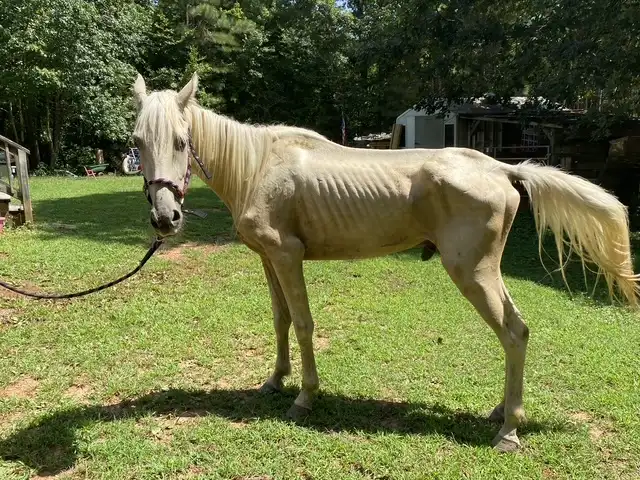
“I was shocked beyond belief when I saw those photos,” Jenn remembered. “I thought, ‘This can’t be him.’ So I reached out, told her that we had Ghost, and asked if she could give me some history.”
Glosson replied right away. She was thrilled to learn that Ghost had ended up with a junior, and she was happy to fill in his backstory.
“I was so glad to hear they’d fallen in love with him,” Glosson said. “Ghost had a run for his money, but he’s ended up where he needs to be.”
He Was Not Staying There
In 2021, Glosson was shopping for a new trail horse and had found a promising lead through an ad on Facebook. In the photos, the Tennessee Walking Horse mare looked “a little underweight” but not so much that Glosson was concerned she wasn’t being cared for. When Glosson arrived to try her out, the first horse she saw was Ghost. Unlike the mare, he was truly emaciated—“literal skin and bones”—and she couldn’t help but speak up.
ADVERTISEMENT
“I was like, ‘What’s going on with this palomino?’ ” Glosson said. “The guy told me he was 2 years old, and says, ‘I just can’t get him to gain weight; we feed him all kinds of stuff.’ ”
Glosson was skeptical. But when the man’s father came out of the house a few minutes later and threatened to shoot the youngster if someone didn’t take him, she knew she had to act.
“We didn’t care what we had to do, but we were determined he was not staying there that day,” Glosson remembered. “We ended up coming home with both horses. It was one of those ‘ask for forgiveness later’ from my husband moments. They tried to get me to pay for him. I said, ‘You were just threatening to shoot him. I’m not paying you; we’re going to load him on the trailer and take him now.’ ”
It took quite some time to load the mare and gelding—Glosson doubts either had ever been on a trailer before—and an hour and a half to get to her farm. Upon arrival, the youngster collapsed as soon as he unloaded.
“He was so dehydrated and malnourished,” Glosson said. “You could see every bone in his body. His feet were horrible, and he had bite marks all over him. He was just a pitiful mess. It was terrible.”
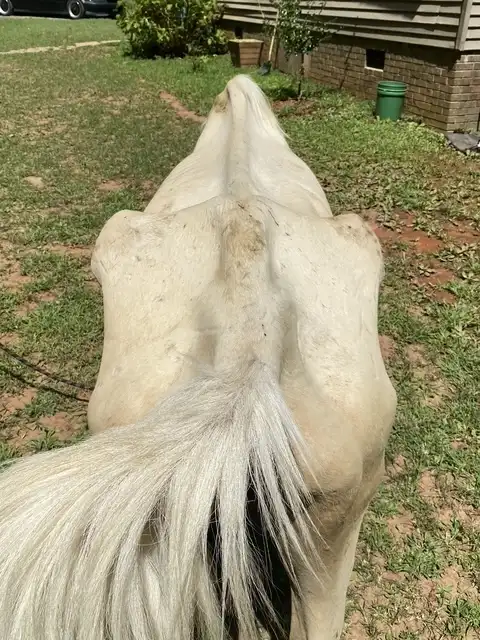
But in the days and weeks to come, Glosson nursed the palomino back to health, offering the youngster many tiny meals, and he quickly gained weight. Although a bit uncertain at first, particularly around men, his sweet personality soon emerged. They named him Ghost, partially due to his pale coat and partially due to his spooky nature.
Glosson, who admits she likes her horses “old and slow,” knew that she wasn’t up for the challenge of starting and training a young horse. Once Ghost’s good health had been restored, she offered him for sale and found what sounded like the perfect buyer.
“She said she had tons of experience, and even that she had Walkers,” Glosson said. “She was so excited.”
Glosson tries to keep track of the horses she has sold, so about a year later, she reached out to the woman to see how Ghost was doing. The woman replied that she was thinking of selling him, because “she had too many horses.” Glosson asked if she could come see Ghost.
“So we drive out there and, well, he wasn’t as skinny as he was before, but he was very thin again,” Glosson said. “His feet were horrible. He didn’t look like he should.”
Immediately, Glosson offered to buy Ghost back. After she got him home, she once again introduced tiny, frequent meals, had his feet taken care of, and nursed him back to health. Glosson notes there was no underlying health condition that contributed to Ghost’s condition; she simply kept hay available 24/7 and fed commercial grain in the recommended amounts for a horse his size.
“He’d put the weight right back on,” Glosson said. “It was like, ‘What is with you people?’ ”
Once Ghost’s health had been restored again, she began handling him more on the ground. It soon became clear that his training had not progressed, so Glosson sent him to friends who are professional trainers to get him started under saddle. But when she tried to ride Ghost herself, he threw her.
“I was like, nope, I’m still not ready for a young horse,” Glosson said with a laugh. “He needed to go to somebody who’s got more experience and can enjoy him. He had more life in him than I could give him, and I didn’t need him just sitting in a pasture.
“I knew it was just about finding the right person for him,” she continued. “I knew I was not that person. I loved him, and I love his goofy personality, but I knew we were not a match. I’m so glad he and Lizzie have bonded the way they have. I absolutely love seeing them do things together.”
Starting From the Beginning, Together
ADVERTISEMENT
Although there is an old adage in the horse world that “green on green makes black and blue,” Ghost and Lizzie’s journey together perhaps proves there is always an exception to the rule. With the help of several talented professionals—including colt starter Matt Lovejoy, Kat Fish, Jerry Schurink and Dawn Dascomb, among others—the two started from the beginning and have only grown together ever since.
“He knew how to stop, and turn, and how to pick up his leads, sort of,” said Lizzie, 12, of their first rides together. “He didn’t know how to balance himself.”
“He was not fit,” added Jenn. “He was what you’d expect for only being in training for 60 days.”
Although the Wieckowskis have confirmed through DNA analysis that Ghost is, in fact, a purebred Tennessee Walker, he has never moved in a gaited way, either at liberty or under saddle. But that doesn’t mean dressage came easily to him; Lizzie says it is their hardest phase, and she continues to work on building his topline muscles, to improve his connection on the flat, and is learning how to help him stay balanced. However, the first day Lizzie aimed Ghost at a jump, it was clear they had found his niche.
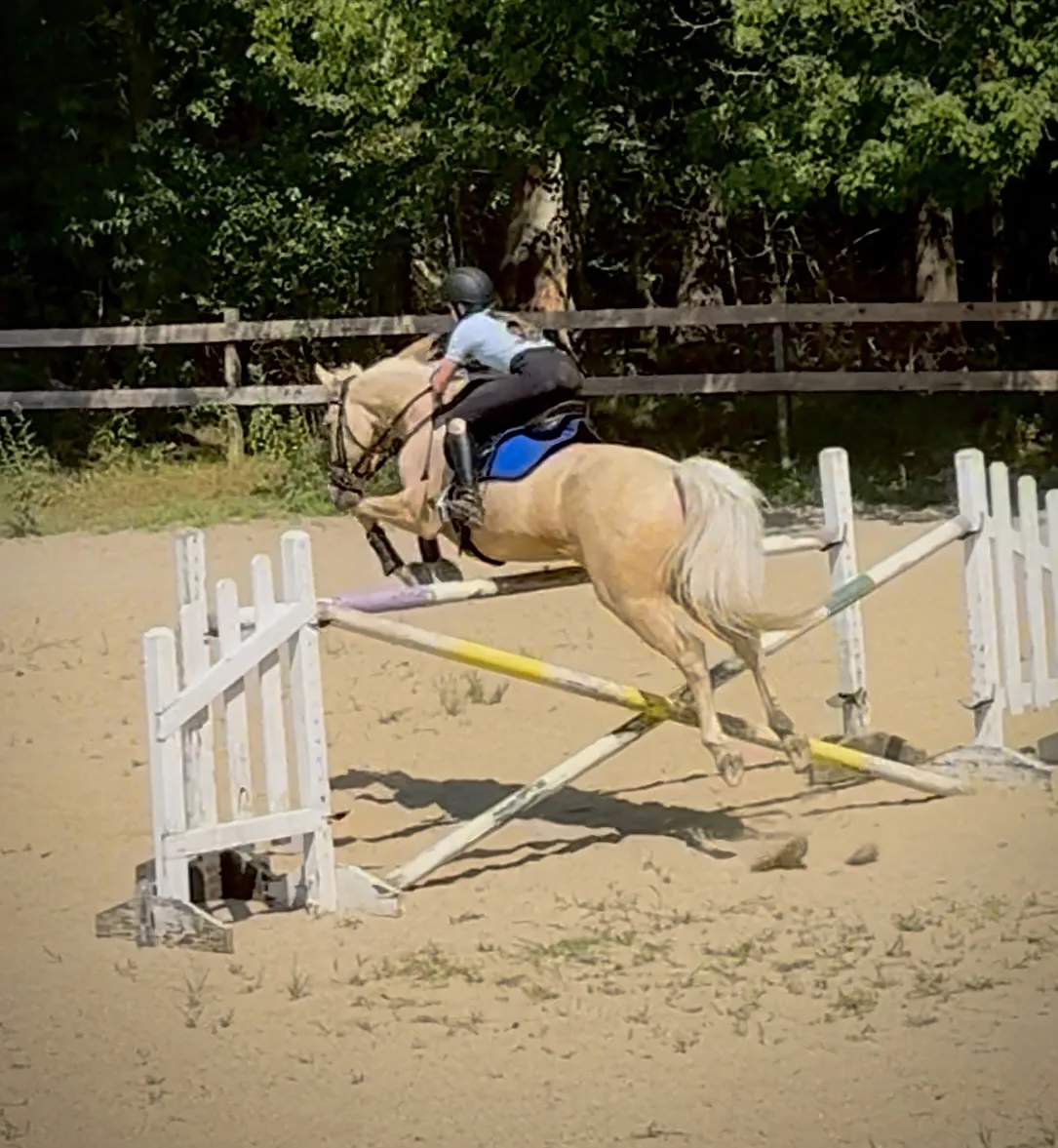
“He just went over the jump by himself,” said Lizzie with a laugh. “I just gave him a little leg, and he popped over it. He was like, ‘I got this!’ He definitely likes to jump.”
As Ghost settled into life with the Wieckowskis, he was still anxious and spooky—at least at first. They could always tell when Ghost was getting worried, because he would chew the side of his tongue. But with 24/7 turnout and the company of a small herd, almost all of those behaviors disappeared.
“It took a few months before he was completely settled,” Jenn said. “But now, he is not anxious at all. He comes up and gives hugs, he’s curious, and he watches everybody. He rarely has an issue that we can’t work through quickly. It’s just a matter of going slow and exposing him—like with any young horse.”
Lizzie says she is not a fan of changing a horse’s name, but as she prepared to enter their first horse show, she felt Ghost deserved to have a show name, like everyone else. They came up with Haunted Blessings—a nod to both his barn name and the fact he had dodged death—twice.
In May 2024, Lizzie and Ghost entered a schooling horse trials hosted by Groton Pony Club in Groton, Massachusetts. Lizzie describes their dressage test that day as being “interesting,” with some bonus moves thrown in that were not part of the pattern. But once Ghost got into the show jumping ring, he found his groove.
“At home, we have limited jumps and space, so I don’t jump too much,” Lizzie said. “When we went in the show jumping ring there, he was like, ‘Game on.’ He overjumped everything and was really forward. He was just like, ‘This is my thing.’ ”
The pair completed the event that day and went on to do several more events and horse shows last season, focusing on jumps set from 2’ to 2’3”. This year, they joined the Triple D Equestrian Pony Club Riding Center, earning their D-2 eventing certification, and entered their first U.S. Eventing Association competitions, showing at the starter level. The Area I Championships, held in conjunction with the Genesse Valley Riding and Driving Club Horse Trials, was their first experience with an overnight competition; their fifth-place finish there has qualified them for the 2026 USEA American Eventing Championships, which they plan to attend.
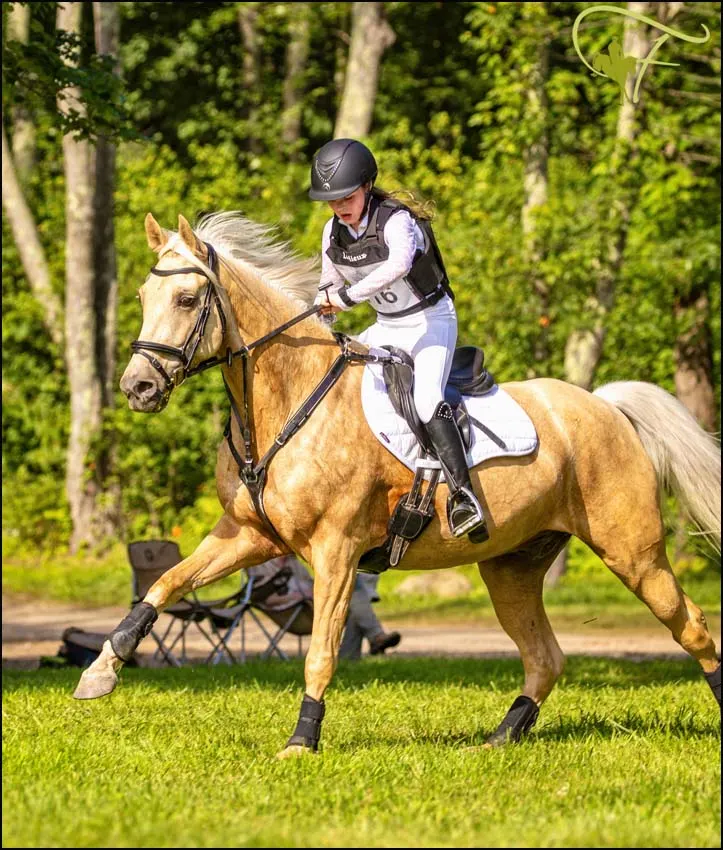
Both mother and daughter acknowledge the process of training a green horse from scratch isn’t always easy, and there have been days when Lizzie was left in tears of frustration. But ultimately, the progress and growth they have experienced over the past two years only motivates them to continue moving forward.
Lizzie has a hard time articulating what Ghost, and his journey, means to her.
“He’s very special to me,” Lizzie said. “We just looked at each other, and we’re the perfect pair. I’ve been working so hard with him, and that’s really special to me, too. I wouldn’t be learning so much about training horses if I didn’t have him.”
“One man’s trash is another man’s treasure,” Jenn said. “He couldn’t be more suited for Lizzie. And when we tell people he’s a Tennessee Walker, we get a lot of, ‘We can’t believe it.’ But you can’t say a horse can’t do something just because of his breed.
“Stories of transformation resonate deeply with others,” she continued. “Seeing a horse transform from abused and neglected to thriving gives people hope in humanity. Their story showcases the resilience and spirit of a horse that was failed not once, but twice, by humans—and who wholly trusts in his new family and gives his all to his little girl.”














